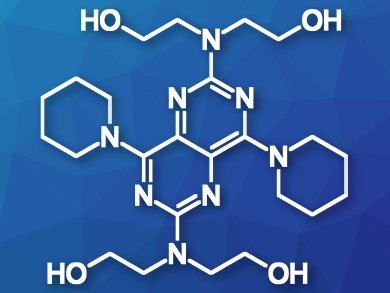Materials that are suitable for the contact with blood are useful for many medical devices and for cardiac applications such as support materials for tissue-engineered heart valves and grafts. Polymers are easy to produce and have the required mechanical strength, but can cause the formation of blood clots.
Alexander M. Stahl and Yunzhi Peter Yang, Stanford University, CA, USA, have developed a biodegradable polyurethane with an incorporated antiplatelet agent that could prevent this problem. The team combined polycaprolactone (PCL) and hexamethylene diisocyanate (HDI) to form the polyurethane. PCL is a biocompatible and biodegradable polyester. The polyurethane was then reacted with dipyridamole (pictured), an antiplatelet drug that prevents the formation of blood clots, which is covalently bound to the polymer in the process.
The resulting material has similar elastic properties to heart tissue and can be used as a support for different types of living cells. The anti-blood-clot drug is slowly released during the polymer’s degradation process, which makes sure that the drug remains effective through the entire lifetime of the implant. According to the researchers, the developed polymer could be a useful tool for cardiac tissue engineering.
- Tunable Elastomers with an Antithrombotic Component for Cardiovascular Applications,
Alexander M. Stahl, Yunzhi Peter Yang,
Adv. Healthcare Mater. 2018.
https://doi.org/10.1002/adhm.201800222



